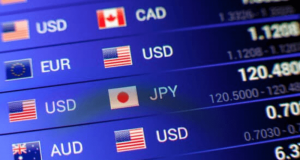 As the official rate of the naira declines against the dollar, traders should keep an eye on the unofficial market for dollar value. The parallel market is volatile and unyielding. It is estimated that a dollar can cost as much as 560 naira today, compared to only 475 naira in January. A 17.9 percent devaluation within eleven months has severely devalued purchasing power.
As the official rate of the naira declines against the dollar, traders should keep an eye on the unofficial market for dollar value. The parallel market is volatile and unyielding. It is estimated that a dollar can cost as much as 560 naira today, compared to only 475 naira in January. A 17.9 percent devaluation within eleven months has severely devalued purchasing power.
The Nigerian economy depends heavily on oil sales and foreign portfolio inflows. The currency exchange rate of the country is directly correlated with the state of the oil industry. When oil prices are high, the naira strengthens. If oil prices are low, the currency depreciates. If the market continues to slump, the country could face major dollar shortage. However, trading on exchange rates this summer in Nigeria could provide an excellent opportunity for investors.
The eNaira currency introduced by the Nigerian government was a practical solution to the country’s economic problems, but it never solved the problem of unstable exchange rates. Since 1993, Nigeria has pegged the naira against the dollar, attempting to bring predictability to international trade. This system is based on foreign currency reserves, which were drained in late 2014 when oil prices fell 70%.
The absence of transparency in the BDC rates has created massive arbitrage in the market. It has cost traders millions of naira. Despite the clampdown by the CBN, the AbokiFX exchange was once the benchmark for exchange rates. With so many uncertainties in the market, the SEC must monitor all transactions to ensure fairness and transparency. Traders should be aware of the risks associated with using BDCs as a trading venue.
Inflows of foreign currency are becoming more difficult to monitor. While the official exchange rate is set by the CBN, there are many ways to avoid it. For instance, a seller in Nigeria can buy foreign currency through an intermediary. The intermediary will open a bank account in the country and remit the money to them. The intermediary will set the exchange rate, but they do not disclose the method they use to set the rate. If you wish to avoid intermediaries and use a foreign exchange rate, consider using a cryptocurrency exchange. Traders can post exchange rates on platforms such as Binance.com to sell forex and see timely prevailing prices.
The SEC’s new rules on digital currencies could provide the framework for financial institutions in Nigeria to trade in crypto. As of now, entities offering digital currency services in Nigeria must secure appropriate category licenses. This includes a digital asset exchange license. The new rules also require that the entity offering crypto products in Nigeria acquire a virtual asset service provider license. Further, the CBN has already mandated a digital asset exchange license.